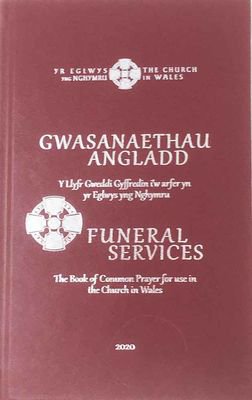Funeral Services 2020
Part one (online text and printed book)
The Funeral Service
The Funeral Service within the Holy Eucharist
The Burial of Cremated Remains
The Funeral Service - The Book of Common Prayer Volume II (1984)
Appendix - The Funeral Service within the Holy Eucharist
Part two (online text only)
Notes, additional services, additional content and sample services
Part three (online text only)
Additional liturgies for special circumstances approved by the Bench of Bishops (not part of the Book of Common Prayer)
Downloads:
Use the arrow buttons in the index to help navigate through the text. Parts 1, 2 and 3 are contained within the PDF.
Ref 1985
This WORD version is available help create your own version of the service:
.
PREFACE

Throughout its history, the Church has been privileged to draw close to people at crucial times of their lives, seeking to be living witnesses to God’s love and grace. For Christians, the end of physical life is not the extinguishing of a person, and funerals therefore number among the rites of passage together with Baptisms and Marriages, marking the major staging posts of life, but which point onwards into the future and the hope of eternal life. Nor does the Church see the human body merely as inconsequential to human identity, but rather, as the habitation of a soul, sacred and deserving of dignity and respect, even after death. The Christian funeral rite must therefore encompass these facets, commending a human being, a soul, to God and to eternity, and providing a respectful and sacred context for the laying to rest of human remains, “in the sure and certain hope of the resurrection.”
There are two further aspects. There must be an acknowledgement, a celebration of all that was good and creative in a person’s life, reflecting something of their eternal significance – their impact on their family and those who knew them, their contribution to human society and life. Faith must also be commemorated, where a person had themselves acknowledged Christ as Saviour, and borne witness to the promise of eternal life found in him. Finally, there is a congregation - family, friends and associates, who will be going through bereavement, and who will want the ceremonies surrounding the funeral to speak to them messages of reassurance, of hope, of faith, of love, and of mercy.
There is a great deal to be achieved in a little time. In the modern context, the formulaic rites of the past retain their usefulness, but congregations are generally looking for more – for a service which reflects the character of the person commemorated, which captures the range of their own feelings and instincts, which expresses for them something of their own beliefs and hopes, and which can offer them personal comfort. The minister of the Church at a funeral will therefore have to shape a liturgy which will respond to all these needs and purposes.
With this in mind, the funeral liturgies approved as part of the Book of Common Prayer for the Church in Wales by the Governing Body in May 2019 comprise of a core rite, which is published in Part One, and extensive resources, which are published in Part Two. The idea is that the essential funeral liturgy is available in Part One, but that Part Two might be consulted, one might even say “mined”, for appropriate supplementary material. We are enormously grateful to the members of the Standing Liturgical Advisory Commission for over a decade’s labour on this liturgy and the accompanying resources, and also especially to Dr Gwendraeth Morgan, who undertook the work of rendering the material in Welsh.
It is the hope of the bishops of the Church in Wales that these rich resources may enable those leading funeral services to create a liturgy which meets all of the manifold needs set out above, but, most importantly, which also serves as the vehicle for a pastorally sensitive proclamation of the Gospel and of the hope that all people may find in the saving work of Jesus Christ, who conquered death in his resurrection.
+Gregory Llanelwy
Bishop with responsibility for Liturgical and Doctrinal Matters
June 2020